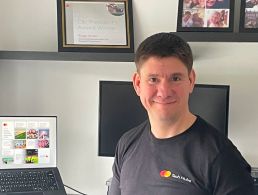Mastercard’s Sarah Cunningham writes about the future of work and how you can prepare for a role that may not exist yet.
The world of work is changing faster than ever before. In our new world, as emerging technologies such as blockchain, artificial intelligence and augmented reality create new industries, new jobs are invented daily. Nobody knows exactly how many new jobs, but experts tell us that the majority of jobs that will exist in 2030 haven’t actually been invented yet.
Such a fast pace of change can feel overwhelming. After all, how do you prepare for a job category or industry that hasn’t even been invented yet?
As somebody who has consciously pivoted career direction more than once – leapfrogging from declining industries to growth industries – I have learned that the best way to prepare for the future of work is to be adaptable and change-agile.
Our very nature means we find change hard. Some find change harder than others, but I believe that adaptability is like a muscle. And the more we build that muscle by widening our range of skills and frequently stepping out of our comfort zone, the stronger we become.
If you’re looking to better prepare yourself for your next role that might not even exist yet, then here are my top tips.
Sarah Cunningham, vice-president at Mastercard’s Dublin Technology Hub. Image: Mastercard
1. Keep an eye on the horizon
Keep one eye on the horizon to predict future trends and avoid surprises.
This is something I learned early on in my career. In the mid-2000s, I was working in retention marketing within a declining industry sector. I knew it wasn’t just the industry I was in that was declining. I could see that the medium I was working with, direct mail, was also rapidly becoming irrelevant.
It didn’t take a genius to figure out that printed brochures sent to arrive in customers’ letterboxes two to five days from now wasn’t the future. I knew I needed to pivot into digital marketing. So I had to carve out my own opportunities.
I found out that another business unit was planning a limited digital marketing campaign to promote a prototype. So, I offered to help – taking on the extra responsibility in addition to my day job. In doing so, I gained the skills I needed to propel me into the future of the marketing industry – digital.
So when another opportunity came up in a growth industry, I had the experience I needed to get that job and all that extra work paid off.
If you’re concerned about how to spot a trend on the horizon or keeping up to date on news around the future of work, actively reading tech and business articles will ensure you don’t miss a trick. This brings me to my second tip.
2. Never stop learning
In our rapidly evolving ecosystem, continuous learning is more important than ever before. Because no matter what sector you work in, your job will almost certainly evolve and change in nature over time as we move towards the future of work.
If you think of your job as a series of discrete tasks, then a recent McKinsey report about the future of work estimates that about a third of those tasks will be automated, at least for the majority of jobs. And the replacement will be new tasks requiring new (and often more technical) skills.
So no matter what our job, we all really do need to keep learning.
If you don’t have the funds to cover an expensive master’s right now, then think about courses you can do online in your own time.
And remember, learning doesn’t always mean formal education. It can also mean:
- Volunteering to work on an extra-curricular project – this is a great option if you also want to increase your professional network and gain senior visibility
- Pausing and reflecting for long enough to take the learnings from your mistakes and failures
- Keeping up with the latest tech and business articles, books, and podcasts
I recognise that it can be hard to find time to keep on top of learning when we all lead such busy lives. So my suggestion is to carve out time. At Mastercard, we offer our employees dedicated time to develop themselves either through internal training platforms or using any external resources that meet their training needs. I also add elements into my daily routine. For example, I listen to podcasts on my daily commute.
3. Increase your suite of tools
A builder doesn’t show up at your door with just a hammer and say, ‘What do you want me to do?’. They show up with a whole toolkit and the ability to do a whole range of jobs.
Future-focused technologists are the same. The strongest developers won’t have just one coding language, they will have multiple languages in their suite of tools. And they will be great at keeping an eye on the horizon – reskilling time and time again as technologies evolve, all the while increasing their versatility.
The best product managers too have experience in more than one area. They are able to speak the language of technologists, have the motivational skills of a coach and the empathy of a psychologist.
David Epstein, the author of the new book Range: Why Generalists Triumph in a Specialized World, says that in today’s rapidly changing world, “we need more people like these … people who start broad and embrace diverse experiences and perspectives while they progress. People with range.”
‘In the future of work, as new skills and job types are invented daily, you might just find that nobody exists with the perfect mix of skills’
Range, he tells us, is also critical if your goal is a leadership role. He cites a LinkedIn study that found one of the best predictors of who becomes an executive was the number of different job functions that someone has worked across within an industry. The more job functions a person has worked in, the more they build up a holistic view of how the industry works as a whole and how to connect the dots between different functions and challenges.
This research resonated for me as I have taken zig-zag route to my current role. From starting out in technology consulting for a global consultancy firm to pivoting to strategy consulting, and then marketing before moving into innovation management within the payments technology industry.
Skip forward a few years, and now – in my current role – I draw on skills learned across all of these seemingly disparate stepping stones along my career journey. Because it turns out they are not disparate after all. It turns out that my broad range of experience perfectly positioned me for my current role.
If you’re looking to build your range, then don’t be afraid to move around a bit. Because, in our new world and in the future of work, it’s no longer about your job title – it’s the breadth and range of skills you bring, and how transferable those skills are, that’s important.
4. Believe in yourself
It takes self-belief to step out of your comfort zone and try new things. But sometimes our harsh inner critic and insecurities can hold us back.
I’ve been there myself. I remember looking at job specs in the past and initially thinking they were a good fit, but then allowing my insecurities to take over and starting to focus on the boxes I didn’t tick rather than those I did.
Arianna Huffington calls this negative, critical voice “our obnoxious roommate living in our head”. I think that’s such a great description. Once we are aware of this phenomenon, it’s easier to channel our inner fearless selves. Remind yourself what experience you do have and what unique strengths you can bring to the role.
And once you have convinced your biggest critic – your obnoxious roommate in your head – you’ll often find that convincing hiring managers is much easier.
I’m not saying you should apply to a job where you only tick 20pc of the criteria. But if you think it’s a generally good fit, and that what you lack in one area, you make up for in another – then believe in yourself. Because if you don’t believe in yourself, nobody else will!
And more importantly, in the future of work, as new skills and job types are invented daily, you might just find that nobody exists with the perfect mix of skills.
Sarah Cunningham is a senior strategy, marketing and innovation professional with more than 20 years’ experience. She is the vice-president at Mastercard’s Dublin Technology Hub.




